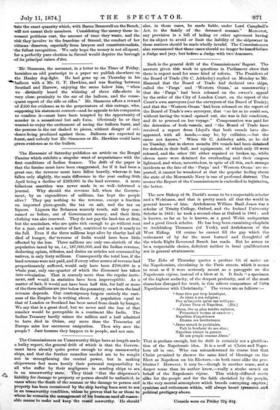The Echo of Thursday quotes a profane bit of satire
on the Napoleonista, circulating in the 'Paris streets, which it seems to treat as if it were seriously meant as a panegyric on the Napoleonic regime, instead of a blow at it. It finds " a specimen of the highest audacity, of- the deepest profanity, and of the most shameless disregard for truth, in this odious comparison of rides Napoli.onienne with Christianity." The verses areas follows :- " Sans etre par trop fanatique, Je tiens it ma religion ; Pen m'importe peon me critique : J'aime Dieu at Napoleon. (Big.) "Jesus, des sa plus tendre enfance,
Promettait vertus et•candeur Napoleon d'experience Etonna sea instituteurs.
"Jesus aimait is proletaire, Fait le bonheur de sea emus ; Napoleon aimait la guerre Et son people ammo Jesus."
That is profane enough, but its drift is certainly not a glorifica- tion of the Napoleonic idea. It is a scoff at Christ and Napo- leon all in one. Who can misunderstand its coarse hint that Christ promised to shower the same kind of blessings on the Elect as Napoleon on his Electors,—in both cases alike the pro- letairea ? However, it may be—though in another sense, and a deeper sense than its author knew,—really a stroke struck on behalf of the Napoleonic regime. This widely-diffused scorn alike for the people and for the faith cherished by the people, is the very mental atmosphere which breeds corrupting empires ; cynicism and •rottenness within, will always breed tyrannies .24d political profligacy-above.


































 Previous page
Previous page